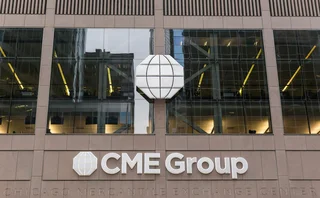
BIS: decline slowing on derivatives exchanges
Volumes continued to fall on international derivatives exchanges this year, but there are signs of recovery, according to the latest figures from the Bank for International Settlements (BIS), released today.
The BIS's latest quarterly review reported "a continued but limited decline of activity on the international derivatives exchanges" in the first three months of the year, with activity starting to increase towards the end of the quarter. Interest rate derivatives turnover was similar to the last quarter of 2008, at $324 trillion, down slightly from $345 trillion, though this masked a sharp drop in North America and an increase in Europe. Equity products turnover fell sharply from $58 trillion to $38 trillion, with falls in all major markets. Foreign exchange derivatives turnover also fell, but Australian and New Zealand dollar future volumes rose significantly, "possibly driven by renewed interest in carry trades", the report said.
The BIS also highlighted the effects of the downturn on derivatives users in Latin America - it criticised the knock-in, knock-out forex options sold widely by Brazilian and Mexican companies to take a long position on their own domestic currencies, which left them with massive losses when Latin American currencies fell last year - it estimated the losses at $4 billion in Mexico for the last quarter of 2008, and $25 billion in Brazil.
"The complexity of such deals and the fact that they were done privately highlights the lack of transparency in these markets, as many of these companies did not disclose any information on their derivatives positions. One result was a review of derivatives exposures across the region as policymakers realised that these exposures could pose systemic risk. Looking forward, policymakers will need to balance financial stability against market development in considering possible regulation of corporate derivatives risk," the BIS wrote.
By contrast, increasing reliance by regional banks on financing from local deposits rather than international capital markets "may have stabilised financing in the region" by insulating local banks from the drop in their local currencies. The same was true of the increasing use of local bonds by companies in the region. "Local capital markets may have to some extent acted as a 'spare tyre' during the crisis, reducing vulnerabilities to declines in international bond finance," the BIS added.
See also: Sell suits
First fall in OTC notional, says BIS
Record fall in cross-border claims
LatAm regulators demand derivatives disclosure
Only users who have a paid subscription or are part of a corporate subscription are able to print or copy content.
To access these options, along with all other subscription benefits, please contact info@risk.net or view our subscription options here: http://subscriptions.risk.net/subscribe
You are currently unable to print this content. Please contact info@risk.net to find out more.
You are currently unable to copy this content. Please contact info@risk.net to find out more.
Copyright Infopro Digital Limited. All rights reserved.
As outlined in our terms and conditions, https://www.infopro-digital.com/terms-and-conditions/subscriptions/ (point 2.4), printing is limited to a single copy.
If you would like to purchase additional rights please email info@risk.net
Copyright Infopro Digital Limited. All rights reserved.
You may share this content using our article tools. As outlined in our terms and conditions, https://www.infopro-digital.com/terms-and-conditions/subscriptions/ (clause 2.4), an Authorised User may only make one copy of the materials for their own personal use. You must also comply with the restrictions in clause 2.5.
If you would like to purchase additional rights please email info@risk.net
More on Markets
Opinions split on EU bond balance sheet squeeze
Some say QT and issuance wave will hamper intermediation; others say dealers nimble enough to respond
Eurex looks to shine ‘more light’ on off-book liquidity
Block order book initiative to aid price discovery slated for later this year
CME outage sparks FX soul search
How November’s halt exposed fragile wiring of new futures-led market structure
CME outage exposed FX market’s futures dependency, says SNB
Study finds EUR/USD spreads widened eightfold as non-bank PTFs blew out by nearly 30 times in November halt
CME rankles market data users with licensing changes
Exchange began charging for historically free end-of-day data in 2025
Gap risk fears push FX traders into Sunday-night Asia hours
Volumes surge at Singapore open as Trump’s weekend announcements force early risk management
BBVA joins growing Spire repack platform
Spanish bank becomes 19th dealer on multi-bank SPV issuer amid rising investor interest
ISITC’s Paul Fullam on the ‘anxiety’ over T+1 in Europe
Trade processing chair blames budget constraints, testing and unease over operational risk ahead of settlement move







